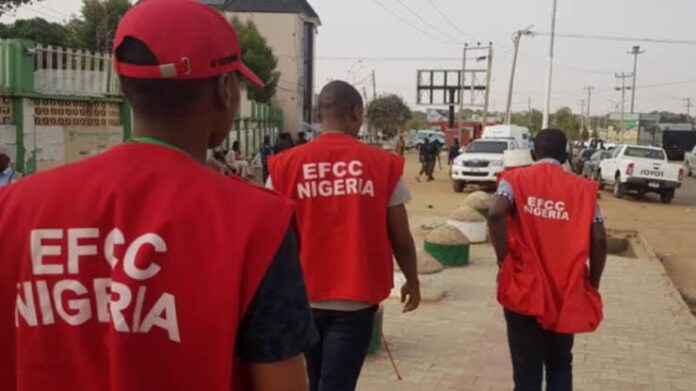Anambra withdraws from suit seeking to declare EFCC illegal
The Anambra State Government has announced its withdrawal from a lawsuit aimed at declaring the operations of the Economic and Financial Crimes Commission (EFCC) illegal.
In a notice filed with the Supreme Court, Anambra’s Attorney General, Prof. Sylvia Ifemeje, indicated that the state no longer wishes to participate in the legal action originally initiated by Kogi State. The withdrawal notice is dated October 20, 2024.
This development coincides with Osun State’s request to consolidate its grievances against the EFCC with those of Kogi State. Osun’s Attorney General, Mr. Oluwole Bada, informed a seven-member panel led by Justice Uwani Abba-Aji that Osun is seeking the same reliefs as Kogi in this case.
While Sokoto State, previously a co-plaintiff, did not send a representative to the proceedings on Tuesday, other states in attendance included Kogi, Kebbi, Katsina, Jigawa, Oyo, Benue, Plateau, Cross River, Ondo, Niger, Edo, and Bauchi, as well as Adamawa, Taraba, Ebonyi, Imo, and Nasarawa.
READ ALSO: Oil magnate files ₦5bn lawsuit against EFCC for being declared wanted
The Attorney General of the Federation and Minister of Justice, Prince Lateef Fagbemi, SAN, appeared as the sole defendant in the case and did not oppose Anambra’s withdrawal. Notably, 16 states have approached the Supreme Court to challenge the operations of the EFCC.
These states argue that the anti-graft agency was not validly established under the administration of former President Olusegun Obasanjo. It is important to remember that the EFCC was created by an Act of the National Assembly on December 12, 2002, during Obasanjo’s presidency.
Following the Senate’s appointment and confirmation of its pioneer Executive Chairman, Mallam Nuhu Ribadu, along with other administrative officers, the EFCC began its operational activities on April 13, 2003, although its Establishment Act was subsequently amended in 2004.
In the ongoing suit before the Supreme Court, the states, represented by their respective Attorneys General, argue that section 12 of the 1999 Constitution, as amended, was not adhered to prior to the EFCC’s commencement of operations.
The plaintiffs contend that it is a constitutional requirement that a majority of the Houses of Assembly of States must vote and agree to the passage of the EFCC Act, asserting that this is not solely within the purview of the National Assembly.
They informed the Supreme Court that none of the states were consulted before the EFCC was established by the administration of former President Obasanjo.
They argued that the Supreme Court, in a previous case involving Dr. Joseph Nwobike vs. Federal Republic of Nigeria, ruled that the EFCC Establishment Act was based on a United Nations Convention against Corruption. The plaintiffs contended that when this law was enacted in 2004, the provisions of Section 12 of the 1999 Constitution, as amended, were not followed.
The plaintiffs maintained that since due process was not adhered to before the EFCC Establishment Act was enacted, it cannot be applicable in states that did not approve it, in accordance with the provisions of the 1999 Constitution, as amended.
They argued that any agency formed as a result of the Act should be regarded as an illegal institution.
READ ALSO: EFCC re-arraigns ex-Gov, Commissioner over alleged ₦5.78bn fraud
The 16 states are relying on the fact that since the 1999 Constitution, as amended, is the supreme law of the land, any Act of the National Assembly that is inconsistent with the Constitution should be declared a nullity.
Kogi State specifically raised six questions for the apex court to determine while seeking nine principal reliefs.
Among other things, it prayed the Supreme Court for: “A declaration that the Economic and Financial Crimes Commission (EFCC), the Nigerian Financial Intelligence Unit (NFIU), or any agency of the Federal Government of Nigeria cannot investigate, requisition documents, invite, or arrest anyone regarding offenses arising from or related to the administration and management of funds belonging to Kogi State or any Local Government Area within Kogi State.”
Additionally, it sought: “A declaration that the Federal Government of Nigeria, through the Nigerian Financial Intelligence Unit (NFIU) or any agency of the Federal Government, lacks the power to issue any directive, guideline, advisory, or any instrument whatsoever for the administration and management of funds belonging to Kogi State or any Local Government Area within Kogi State.”
Proofreading by Uchechi Ojo, Sub-editor at Neptune Prime.
Follow the Neptune Prime channel on WhatsApp: https://whatsapp.com/channel/0029Va74ZvU2v1IqKByXoX3d
Do you have breaking news, interview request, opinion, suggestion, or want your event covered? Email us at neptuneprime2233@gmail.com
Follow the Neptune Prime channel on WhatsApp:
Do you have breaking news, interview request, opinion, suggestion, or want your event covered? Email us at neptuneprime2233@gmail.com





